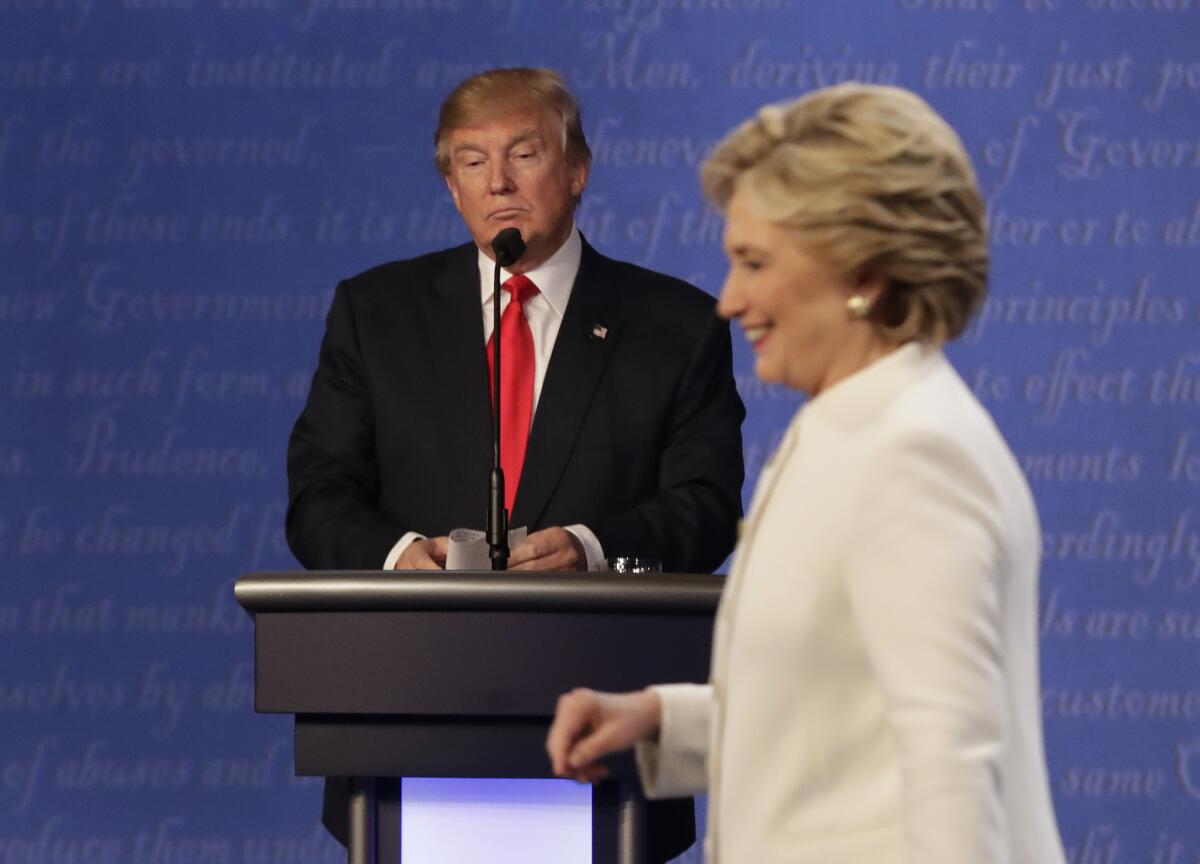Why the Justice Department operates free of White House sway

- Share via
Reporting from washington — The revelation that President-elect Donald Trump does not intend to seek a new investigation into Hillary Clinton was startling not only because it seemed to reverse a campaign pledge.
It also suggested that Trump thinks that that’s his decision to make, reflecting an apparent lack of regard for the cherished independence of the Justice Department, which is responsible for conducting investigations without the influence or opinion of the White House.
Trump on Tuesday told reporters and editors of the New York Times that “I don’t want to hurt the Clintons; I really don’t,” despite having said during the campaign that he’d seek a special prosecutor to investigate Clinton and that she’d be in jail if he were elected.
Some questions and answers about how the White House and Justice Department interact — and how the system actually works:
Do presidents oversee investigations of the Justice Department?
Definitely not.
Long-standing protocol dictates that the FBI and Justice Department operate free of political influence or meddling from the White House. That’s one reason that the FBI director serves a 10-year term and does not turn over the reins as presidential administrations come and go. It also means that presidents are not supposed to supervise, initiate or stop law enforcement investigations.
White House officials and Justice Department lawyers aren’t even meant to talk with each other about ongoing criminal investigations or civil enforcement actions, though there is some leeway granted for matters of national security.
A 2007 Justice Department memorandum says the department will advise the White House of criminal or civil enforcement matters “only where it is important for the performance of the president’s duties and where appropriate from a law enforcement perspective.”
“This limitation recognizes the president’s ability to perform his constitutional obligation to ‘take care that the laws be faithfully executed’ while ensuring that there is public confidence that the laws of the United States are administered and enforced in an impartial manner,” the memo states.
Why is that so important?
Justice Department officials have long considered it imperative that their investigations not be politicized or tainted by suspicions of interference by the White House or other elected leaders.
Any hint of political meddling could undermine public faith in the legitimacy of an investigation. It could raise the prospect that a person is being investigated, or is being spared from investigation, on the whims of political considerations rather than evidence of guilt or innocence.
Past episodes that have blurred the line between politics and the administration of justice have been fairly disastrous for the government.
During the Watergate scandal, for instance, President Nixon refused to turn over White House audiotapes to Archibald Cox, a special prosecutor investigating the matter. Atty. Gen. Elliot Richardson and Deputy Atty. Gen. William Ruckelshaus both resigned rather than follow Nixon’s order to fire Cox. Cox was then fired at Nixon’s request by then-Solicitor Gen. Robert Bork, an episode that became known as the Saturday Night Massacre.
In 2007, Alberto Gonzales resigned as attorney general in the wake of the dismissal of several U.S. attorneys, who serve at the president’s pleasure. Some of the fired attorneys said they felt pressured to investigate Democrats before elections, though Gonzales said they were dismissed based on their performance records.
Does that mean presidents have never weighed in publicly on ongoing matters?
The White House has typically balked at questions about the status of Justice Department investigations. But officials, including the president, haven’t always strictly abided by that firewall.
President Obama caused a stir in 2014 when he appeared to prejudge an ongoing FBI investigation into the Internal Revenue Service by telling Fox News that there was “not even a smidgeon of corruption.”
Obama also said in 2012 that there was “no evidence” that his CIA director David H. Petraeus caused harm to national security through his affair with his biographer. The FBI later concluded that he had given the woman, Paula Broadwell, classified information, and Petraeus pleaded guilty.
Obama told CBS’ “60 Minutes” in October 2015 that Clinton’s use of a private email server as secretary of State was a mistake but didn’t endanger national security — an eyebrow-raising statement given that the FBI’s investigation was still underway and law enforcement officials at the time had made no such public characterization.
Conversely, Justice Department and FBI officials are expected under their own protocol to avoid taking public investigative action in the run-up to an election for fear of being seen as influencing the outcome.
That’s one reason department officials frowned on FBI Director James Comey’s disclosure to Congress, less than two weeks before the election, that the FBI would review emails it had recently found that it thought might be connected to the Clinton email case. He announced the conclusion of that review two days before the election with no charges being brought.
Tucker writes for the Associated Press.
ALSO
How Trump could use the presidency to help his own business interests
New York sees surge of swastika vandalism since the election
Judge blocks Obama’s attempt to require overtime pay for millions of Americans
More to Read
Sign up for Essential California
The most important California stories and recommendations in your inbox every morning.
You may occasionally receive promotional content from the Los Angeles Times.










